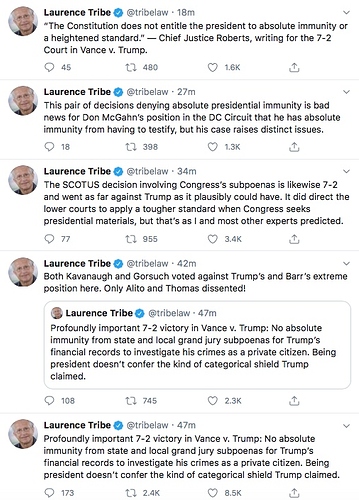I am going to go out on a limb and say the court got it right. What the house was doing was correct, but the house counsel took an absolutist position, refused to acknowledge limits. So that forced the Supreme Court to lay out a test. That requires a remand. The liberals went along as they did not want a future Republican senate going full Benghazi, and they know the Republicans are more likely to go there.
Doug letter (house counsel) needs to be fired and someone who understands how courts work hired to represent the house.
The Vance case was a great win for accountability. Unfortunately, unless they indict trump and put the details in the indictment, trump gets to hide his taxes through the general election.
P.s. adding a lot more detail to my post:
I have now read both 7-2 majority opinions (by Roberts, joined by the 4 liberals and Gorsuch and Kavanaugh) carefully (earlier just read them quickly). Wanted to give a little perspective.
First, the Vance case (allowing the NY DA to subpoena all of Trump’s records) is a clear win. Given that as Trump has shown, he can control the federal criminal prosecution system via corrupt Attorney General, we really need state authorities to address criminality by a president. Vance (who is a competent guy, with a well run office) now gets the records. The problem is that grand jury records are secret. So Trump’s taxes don’t get released. The only way we see them is if Vance indicts Trump, and puts details into his indictment (what is called a “speaking” indictment). I think this is highly unlikely to happen before the election.
So a win for accountability and democracy, but not necessarily for getting Trump’s taxes before November.
Second, the house “won” but really lost, the case they had requesting Trump’s financial returns. Trump argued he was immune, and the Court quickly rejected that argument.
But, the problem was that the House – lead by a general counsel Douglas Letter who is IMHO a total fool – took absolutist positions. Throughout the litigation they argued that as long as they had a letter laying out a “proper purpose” that Courts could not look further. And when pushed at the oral argument as to what limits there were, Letter who was arguing the case (and should never had been let near the supreme court) said there was no limit.
The Supreme Court does not like no limits. The opinion highlights how the House said no limits, which is a rather direct shot at Letter. And given that republicans have shown a willingness to abuse the congressional investigation process (see Brenghazi) the four democratic judges did not want to empower people who were willing to investigate to embarrass.
So the result was 7-2, Roberts writing, laying out a series of factors to be considered by courts. The problem was that having taken an absolutist position in the lower court (rather than laying out multiple arguments and evidence as skillful litigators do) there was no record for the Supreme Court to affirm the decision, and they had to remand for further proceedings. These will run well past November.
A skillful lawyer would have anticipated the factors the Supreme Court reached for, they are all over the cases, and were simply stated by Judge Roberts as:
"First, courts should carefully assess whether the asserted legislative purpose warrants the significant step of involving the President and his papers. “‘[O]ccasion[s] for constitutional confrontation between the two branches’ should be avoided whenever possible.” Cheney v. United States Dist. Court for D. C., 542 U. S. 367, 389–390 (2004) (quoting Nixon, 418 U. S., at 692). Congress may not rely on the President’s information if other sources could reasonably provide Congress the information it needs in light of its particular legislative objective. The President’s unique constitutional position means that Congress may not look to him as a “case study” for general legislation. Cf. 943 F. 3d, at 662–663, n. 67.
Second, to narrow the scope of possible conflict between the branches, courts should insist on a subpoena no broader than reasonably necessary to support Congress’s legislative objective. The specificity of the subpoena’s request “serves as an important safeguard against unnecessary intrusion into the operation of the Office of the President.” Cheney, 542 U. S., at 387.
**Third, courts should be attentive to the nature of the evidence offered by Congress to establish that a subpoena advances a valid legislative purpose. The more detailed and substantial the evidence of Congress’s legislative purpose, the better. See Watkins, 354 U. S., at 201, 205 (preferring such evidence over “vague” and “loosely worded” evidence of Congress’s purpose). That is particularly true when Congress contemplates legislation that raises sensitive constitutional issues, such as legislation concerning the Presidency. In such cases, it is “impossible” to conclude that a subpoena is designed to advance a valid legislative purpose unless Congress adequately identifies its aims and explains why the President’s information will advance its consideration of the possible legislation. Id., at 205–206, 214–215. **
Fourth, courts should be careful to assess the burdens imposed on the President by a subpoena. We have held that burdens on the President’s time and attention stemming from judicial process and litigation, without more, generally do not cross constitutional lines. See Vance, ante, at 12–14; Clinton, 520 U. S., at 704–705. But burdens imposed by a congressional subpoena should be carefully scrutinized, for they stem from a rival political branch that has an ongoing relationship with the President and incentives to use s-poenas for institutional advantage."
(bolded text is from the opinion, and is the court’s “test”). Not a lot of soaring rhetoric there, just the kind of thing that any decent lawyer would have anticipated, and built a record of. Court lays out a test to judge the issue. The problem is that the Lower Court did not address some/all of these issue, and/or Letter did not address how each of the potentially relevant factors applied to this case in his brief.
So while no Trump’s taxes, I have to say, that they fault of this is the democratic appointed house counsel and whomever is directing him. Part of the problem is a series of committee chairs who are (a) not lawyers (or at least not real lawyers), and (b) sort of old school pols. People like Jerry Nadler, Richard Neil, Elliot Engel, are just not capable of doing the kind of detailed work that say Adam Schiff did in the impeachment. And the result is a hash like what they put before the supreme court.
Put another way, this was not something that the conservative supreme court was going to fix for the democrats.
There is an old saying that “hard cases make bad laws” and unfortunately, the democrats made this a hard case given how they litigated it, and had the Court just given the House untrammeled power to investigate, well the republican controlled senate or house of the future would have used that power to try to do in a democratic president. And given that Republicans are more likely to abuse the power, it is probably good long term that the Supreme Court set down a test and some limits.



